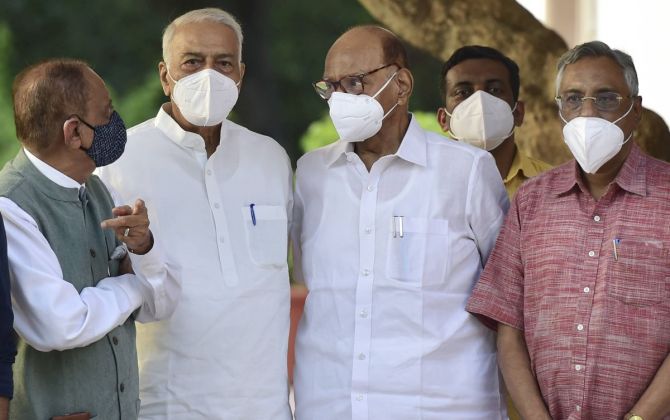Pawar and his Manch can deliberate to their hearts' content, but so long as the Congress does not play ball the BJP has little to worry, asserts Virendra Kapoor.

The recent meeting of the Yashwant Sinha-headed Rashtriya Manch at Nationalist Congress Party President Sharad Pawar's home in Delhi is yet another straw in the wind indicating a move to form an all-embracing front to challenge the Bharatiya Janata Party in 2024.
Of course, it is early days yet, and the parliamentary poll is nearly three years away.
But without taking on the BJP in the intervening assembly elections between now and the Lok Sabha poll the effort to dislodge Narendra Damodardas Modi would become that much harder.
A few days prior to the Rashtriya Manch meeting, Prashant Kishore, the professional pollster, met Pawar in Mumbai, providing an early inkling that the NCP chief might be keen to try and bring together the diverse and divided Opposition on a single anti-BJP platform.
Of course, Pawar can hardly be expected to disclose what was discussed, but he could not have talked the wet Mumbai weather with the poll strategist.
That he again met Kishore after the much-publicised meeting of the Rashtriya Manch in Delhi further confirmed that he might have commissioned him to try and project him on the national stage as a prime ministerial candidate.
At 80, the prime ministership is the solitary post that has eluded the wily Maratha strongman.
Having been a chief minister at a relatively early age and having held key ministerial posts in multiple central governments, it is the top job alone that now matters to Pawar in his twilight years.
But despite his national image, the problem is that Pawar is not even the undisputed leader of Maharashtra.
He has considerable influence in the state, but unlike Mamata Banerjee, who single-handedly triumphed in West Bengal for the third straight time, the NCP has to share power with two other parties in the state.
However, Pawar seeks to more than make up for his lack of electoral appeal by superior networking with the political and corporate worlds -- and, of course, on the back of a huge war chest built up through a career spanning over half a century.
It is his networks which pitchfork him as a contender for prime ministership whenever a vacuum occurred at the Centre, only for Pawar to miss the bus, with the likes of H D Deve Gowda and Inder Kumar Gujaral pipping him to the top prize.
Nonetheless, it is undeniable that among the dozen odd Opposition leaders, including Rahul Gandhi of the Congress, Pawar comes across as the foremost leader capable of bringing the diverse and disparate Opposition groups together on a single platform.
There may be wider acceptability among the voters inclined not to vote for the BJP about Pawar's name rather than any other Opposition leader.
Also, given the fact that the solitary national party in the Opposition, the Congress, is still mired in internal strife and the nation does not appear ready to accept Rahul Gandhi, Sonia Gandhi's preferred nominee for the top job, it makes sense for Pawar to stake his claim, if not formally but by initiating the search for common ground among the anti-Modi forces for a credible alternative to emerge by 2024.
Pawar hiring Kishor, who after the latter's stupendous success in the West Bengal election is much sought after by political leaders going into state elections, to help him become the nucleus of the anti-Modi campaign therefore should not come any surprise.
Kishor does not come cheap and Pawar has no dearth of funds.
But what next? The Rashtriya Manch meeting did make a lot of noise, but nothing of significance emerged.
For one, the Congress leaders, even those who were invited, pointedly stayed away.
Two, no leader of significance attended the meeting.
From Pawar's remarks in Mumbai a couple of days after the Manch meeting it was clear that he encouraged Yashwant Sinha to try and collect a handful of second-rung Opposition leaders along with a few known critics of the Modi government from the ranks of the so-called public intellectuals to explore common ground for a potential third front.
While he himself stayed inside his bungalow, only showing up for a few short minutes at the end of the Manch's deliberations, Pawar's candid admission that Sinha was tasked to prepare ground for the emergence of a third front should leave no one in doubt that he is actually a proxy for Pawar.
While being a member of the Trinamool Congress, Sinha in his latest avatar is not propping up Mamata Banerjee as a prime ministerial candidate.
This may be pragmatic. Following Lal Bahadur Shastri's sudden death in January 1966, then Congress president K Kamaraj refused to become prime minister, arguing that he was fluent only in Tamil and hardly spoke a word of English, what to talk of Hindi. (Instead he propped up Indira Gandhi as prime minister and a few years later came to deeply regret the decision.)
Mamata Banerjee is not as bad as Kamaraj, but the truth is her acceptability outside West Bengal is even far less than that of Pawar.
Of course, without the Congress any third front will be stillborn, a point conceded by Pawar.
Yet where Pawar held back was on the leadership question.
He said the brief for the Manch was to locate common ground for the emergence of a third front while the leadership question can be left for later.
This is the rub of the problem.
Quite clearly, Pawar will not expend his time and energy to promote Rahul Gandhi as prime minister.
And the Congress will not accept anyone else as a prime ministerial candidate, if not Rahul, someone else nominated by Sonia Gandhi. So, you are back to square one.
As for the Congress, given how the party is unable to put its own house in order with dissidence trying to unsettle the party governments in Punjab and Rajasthan, and given the wipeout of the party in the recent elections in West Bengal, Assam and Kerala, the troubles of the Gandhis to maintain a strong grip on the Firm have increased further.
That would explain the failure of 10, Janpath to end the drift and settle the leadership question early, especially in view of the slew of assembly elections next year.
Pawar and his Manch can deliberate to their hearts' content, but so long as the Congress does not play ball the BJP has little to worry.
Feature Presentation: Aslam Hunani/Rediff.com











 © 2025
© 2025